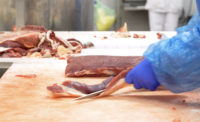Rolling with the tide

By Sam Gazdziak, Editor
The past decade has seen the United States go through some very dramatic changes that have left the economy reeling. The housing market collapse, fears over terrorist attacks and a rise in unemployment are just a few of the things that have affected it.As the population has adjusted its spending habits accordingly, companies have had to find new markets or develop new ways to sell their products. The old ways may not work anymore, and the same old markets may have dramatically shrunk. More often than not, smaller companies, with their flexible manufacturing operations and the ability to make quick decisions, are the ones that can take advantage of these changing market conditions.
Though it's only been in existence for a decade, Spartanburg Meat Processing Inc. has had to make some tough decisions. Five partners started the company after a meat-processing plant in Vermont was sold. After searching for a new location, they found an old Swift processing plant in Spartanburg, S.C.
“We packed our first pound of meat in June of 2000,” recalls JoAnne LaBounty, president of the company. “We had a lot of business, things were going fine, and then 9/11 happened.”
She says that the company lost about 60 percent of its foodservice sales after that, and its partners decided that the business either needed to shrink or grow, because standing pat wasn't an option. As the decision was made to try and grow the business, three of the partners resigned their shares. By 2002, LaBounty had acquired the remaining shares, and Spartanburg Meats became a woman-owned business.
The company's specialty lies in baby-back ribs, though it has the capacity to do a variety of customized products like ham shanks and riblets. With its business in foodservice slow in recovery, the company took its products to the retail market.
“I called up Safeway grocery stores and met with the private-label manager there, and within six months, we had private-label product on the shelf for them,” she explains. “They wanted to get this baby-back rib on the shelf, and once we had the reputation of packing for a big company, even though nobody knew the name Spartanburg Meat, we were able to build more business.”
The company continued to build up its private-label business while rebuilding its foodservice sales. Then came the most recent economic downturn, which has left the restaurant industry down about 30 percent, LaBounty says. Spartanburg Meat turned its attention to different types of retailers, including IKEA and Fred's, to market a smaller baby-back rib.
“We started packing this lower-priced item for Fred's. They forecast they were going to use 4,000 cases last summer, and they sold 21,000 cases within the first two months,” she says. Responding to turbulent economy, Spartanburg Meat has expanded its line to supply a number of discount stores. “We've adjusted to what's happening and started packing less expensive items that people can afford.”
Smaller size, same quality
Spartanburg Meat has grown to employ more than 60 people in two shifts. When the business first started, its peak season was Memorial Day to Labor Day, and it would take weeks off at a time in the off-season. Now, however, the company is steadily busy year round. It still maintains a family atmosphere, however. Nine members of LaBounty’s family work in the business.Spartanburg Meat sources its ribs from a variety of countries, giving it the option to purchase raw materials based on different characteristics. Pigs from Holland, for example, are about 30 pounds lighter than American pigs, so the ribs are smaller. Just because the product is smaller and the price is lower doesn't mean that the quality is reduced, though.
“Every co-packer that we pack for is looking for a quality, affordable item that will offer repeat sales, where people can feel that they can stretch their dollar,” LaBounty says.
Travis Smith, LaBounty's son and general manager for the company, adds that consumers today desire a higher-level eating experience in their own homes.
“People still want to eat ribs, but they'd rather bring them home than pay $18 or $19 for them at a restaurant,” he says. “They still want the same quality at home that they'd get at a restaurant.”
After the company had secured its sources for the inexpensive raw material, Smith says, it took the end products to many different retailers.
“We showed them that they can have this rib that’s an affordable price,” he explains. “People saw it and saw the quality was still there, and they’re selling boatloads of them.”
Without a large in-house sales force, Spartanburg Meat also exhibits at several large shows, including the National Restaurant Association and the International Dairy-Deli-Bakery Association shows, to show off the range of products. Ribs can be sauced, unsauced or dry-rubbed, and can be packaged to go right into the meat case or bulk-packed, so that the delis can sell them in the meat case or behind the counter.
LaBounty says that about 90 percent of the company's sales today comes from retail customers, a sizable change from when business was evenly split between retail and foodservice. LaBounty says that she doesn’t expect the foodservice sector to improve this year, so the company is still focusing on its retail business and hoping restaurant sales pick up in 2011. The company also exports a specialty product to the U.S. military stationed in Iraq, Afghanistan and Jordan.
“We're proud to be sending them a nice, healthy, all-natural item,” LaBounty says.
Along with a number of retail stores nationwide, Spartanburg Meat also counts many top pork processors among its private-label customers. The company packs around 200,000 pounds a week, and LaBounty says it has the capacity to double it. The company has a large spiral oven that cooks the ribs, and it added a million-dollar expansion and put in three smokehouses two years ago.
The company is in the process of adding on a 35,000-square-foot warehouse to give it more freezer space. LaBounty says that there are plans to double the size of the building, but that isn’t likely to happen until 2011.
Along with cooking and smoking ribs and other items, the company has two cookers to make its own sauce. Along with its two house specialties, Smith estimates that Spartanburg Meat produces about a dozen other varieties of barbecue sauce, made to the customer's specifications.
“The biggest thing is that we never sit back and get complacent with what we've got,” Smith says. “These guys are pushing every single day, and they never stop looking for new ideas and new things to do.”
Being a private-labeler has allowed the company to move forward with its ambitions and goals without facing the limitations of being a small company.
“When you … go to someone like Costco or Sam’s Club — and I have — we can’t get [them to carry] our brand, because they want name recognition,” LaBounty says. However, thanks to the company’s partnership with Maple Leaf Foods, the company is getting its products into Costco.
LaBounty notes that supplying products to retail stores under the Spartanburg Meat brand is a costly venture. In one instance, she said that she would have had to pay $1,000 per store slotting fees plus $35 per store per month for advertising, amounting to about $200,000 in costs before the product was stocked.
“But because they did it under private label, it’s all their expense,” she says. “With private label, we can give everybody the best price and the best deal.”
Smith says that once the retail management actually sits down and tastes the ribs, getting into the store is usually assured.
“We had lunch out [at a retailer], and there were supposed to be five or six people to try them,” he says. “We ended up with the whole corporate staff there. They were lined up and down the stairs trying to get into the lunchroom, because they smelled us cooking ribs down there.”
He adds that the company’s relatively small size (it generated approximately $20 million in sales last year), also allows it to produce a custom product or a custom sauce for a customer.
“We’re not a running a 3 million-pound-a-week operation where you can’t make a change,” he says. “We’re small enough to be able to adjust to what is needed.”
In spite of the challenges that Spartanburg Meat has had to weather in its short history, LaBounty says she is glad to be in the food industry right now. Along with her plans for future expansion, she has some ideas for new products that the company will try in 2010. She says that her ability to plan ahead came from her father.
“He was in industrial building supplies,” she explains. “He would always go out and source new items that he thought was going to be the need, and he always stayed ahead of the game.”
Looking for a reprint of this article?
From high-res PDFs to custom plaques, order your copy today!





